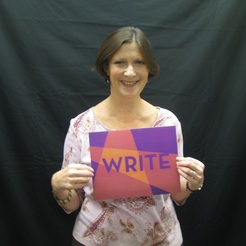 Young Playwrights’ Resident Teaching Artist Kate McGrath wears many hats: she is an educator, playwright, and dramaturg, whose work for--what’s that, you say?—what is a dramaturg? Good question. As part of the Young Voices process, winning student playwrights work closely with a director, professional actors, and a dramaturg to develop their work and to prepare it for performance. An elusive position, a dramaturg—like Kate—is a wearer of many hats. Since it is a crucial part of the Young Voices process and a unique opportunity for our student playwrights to experience the development of new work, we asked Kate, who is one of three dramaturgs working with students for Young Voices, to explain her role as a dramaturg to find out what exactly that means for the process of taking Young Voices page to the stage. What is your role as a dramaturg in the Young Voices process?
I’m an advocate for the playwright, and for the work itself. In the wonderful collaborative world of new play development, many opinions are solicited and come from directors, designers, producers, actors and even the playwright’s own family or friends! Many weigh in about revisions, strengths and weaknesses. A dramaturg’s job (for Young Voices) I think is to assist a monologuist in considering these multiple points of view, and consider revision, but also maintain the integrity and strength of the piece as it was originally written. What do you do? I set up a way to keep track of drafts which in our case means googledocs and e-mails. I do encourage playwrights to keep all of their drafts in one handy place and never delete anything completely. This is kind of hard to enforce since it takes a little copying and pasting, but a good philosophy for writing and rewriting in general—you never know when you may want to put something back, or look up a past phrase or idea or line! I also encourage trying things just for the heck of it—experimenting with who the monologue is spoken to, for example, or adjusting a setting to make the situation more concrete and immediate. For example, we just had a playwright add the character doing a specific activity at the start of a monologue—and it has really made a big change! How do you work with students to prepare their monologues for the director and actor in performance? I try to be in attendance when this kind of work happens, but that is not always possible. I send e-mails with thoughts that have occurred to me, reactions to their revisions, and I have been using the “comment” function on googledocs because I am able to zero in on a particular line and say, “let’s see what the actor does with this” and we can all view that same idea in prep for rehearsal. My director and I have sometimes different ideas about how the work itself might evolve to become clearer, more dramatic, more personal, have more of a build—all that kind of thing—but the best part of Young Voices is the willingness from all team members to play around a bit with the work, and encourage experimentation. And above all, we all value the voice of the student.
0 Comments
Leave a Reply. |
Categories
All
|
|
This work is licensed under a Creative Commons Attribution-NonCommercial-ShareAlike 2.0 Generic License.
|
|
© Philadelphia Young Playwrights - 1219 Vine Street, Floor 2 Philadelphia, PA 19107
Phone: 215-665-9226 Fax: 215-665-9228 Email: [email protected] |


